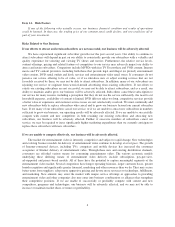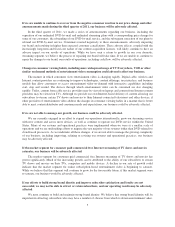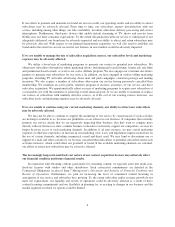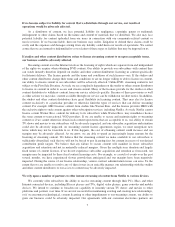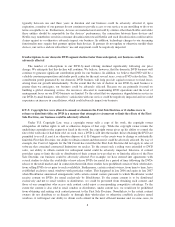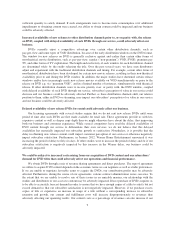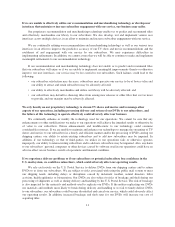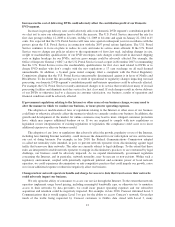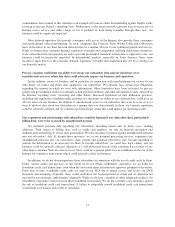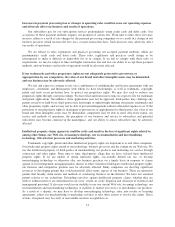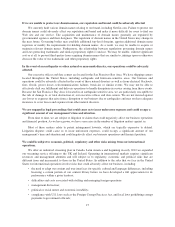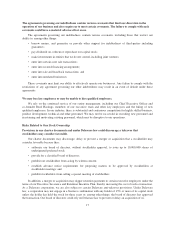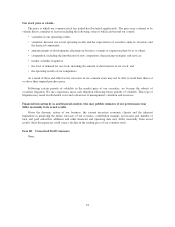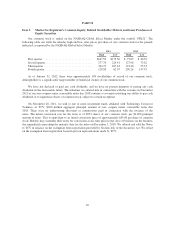NetFlix 2011 Annual Report Download - page 15
Download and view the complete annual report
Please find page 15 of the 2011 NetFlix annual report below. You can navigate through the pages in the report by either clicking on the pages listed below, or by using the keyword search tool below to find specific information within the annual report.commentators have looked to this situation as an example of Comcast either discriminating against Netflix traffic
or trying to increase Netflix’s operating costs. Furthermore, to the extent network operators were to create tiers of
Internet access service and either charge us for or prohibit us from being available through these tiers, our
business could be negatively impacted.
Most network operators that provide consumers with access to the Internet also provide these consumers
with multichannel video programming. As such, companies like Comcast, Time Warner Cable and Cablevision
have an incentive to use their network infrastructure in a manner adverse to our continued growth and success.
While we believe that consumer demand, regulatory oversight and competition will help check these incentives,
to the extent that network operators are able to provide preferential treatment to their data as opposed to ours, our
business could be negatively impacted. In international markets, especially in Latin America, these same
incentives apply however, the consumer demand, regulatory oversight and competition may not be as strong as in
our domestic market.
Privacy concerns could limit our ability to leverage our subscriber data and our disclosure of or
unauthorized access to subscriber data could adversely impact our business and reputation.
In the ordinary course of business and in particular in connection with merchandising our service to our
subscribers, we collect and utilize data supplied by our subscribers. We currently face certain legal obligations
regarding the manner in which we treat such information. Other businesses have been criticized by privacy
groups and governmental bodies for attempts to link personal identities and other information to data collected on
the Internet regarding users’ browsing and other habits. Increased regulation of data utilization practices,
including self-regulation or findings under existing laws, that limit our ability to use collected data, could have an
adverse effect on our business. In addition, if unauthorized access to our subscriber data were to occur or if we
were to disclose data about our subscribers in a manner that was objectionable to them, our business reputation
could be adversely affected, and we could face potential legal claims that could impact our operating results.
Our reputation and relationships with subscribers would be harmed if our subscriber data, particularly
billing data, were to be accessed by unauthorized persons.
We maintain personal data regarding our subscribers, including names and, in many cases, mailing
addresses. With respect to billing data, such as credit card numbers, we rely on licensed encryption and
authentication technology to secure such information. We take measures to protect against unauthorized intrusion
into our subscribers’ data. If, despite these measures, we, or our payment processing services, experience any
unauthorized intrusion into our subscribers’ data, current and potential subscribers may become unwilling to
provide the information to us necessary for them to become subscribers, we could face legal claims, and our
business could be adversely affected. Similarly, if a well-publicized breach of the consumer data security of any
other major consumer Web site were to occur, there could be a general public loss of confidence in the use of the
Internet for commerce transactions which could adversely affect our business.
In addition, we do not obtain signatures from subscribers in connection with the use of credit cards by them.
Under current credit card practices, to the extent we do not obtain cardholders’ signatures, we are liable for
fraudulent credit card transactions, even when the associated financial institution approves payment of the orders.
From time to time, fraudulent credit cards are used on our Web site to obtain service and access our DVD
inventory and streaming. Typically, these credit cards have not been registered as stolen and are therefore not
rejected by our automatic authorization safeguards. While we do have a number of other safeguards in place, we
nonetheless experience some loss from these fraudulent transactions. We do not currently carry insurance against
the risk of fraudulent credit card transactions. A failure to adequately control fraudulent credit card transactions
would harm our business and results of operations.
13



